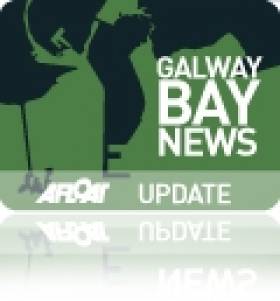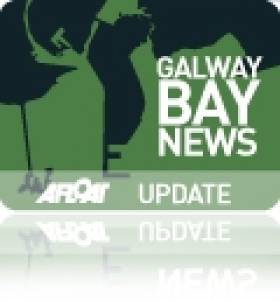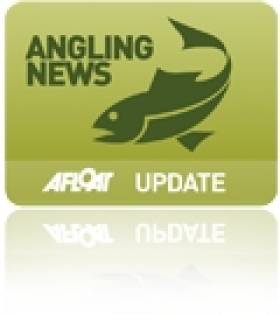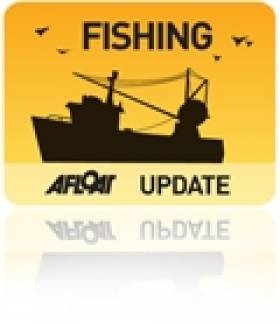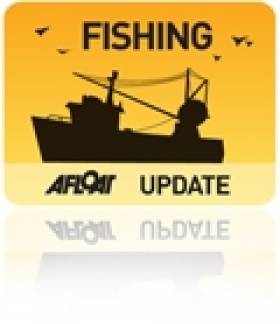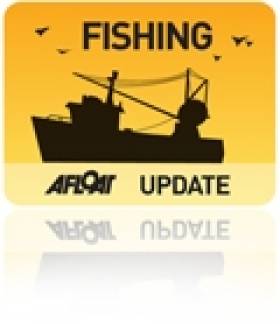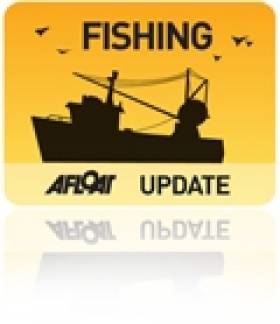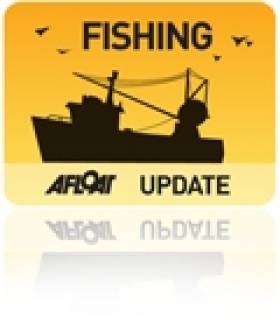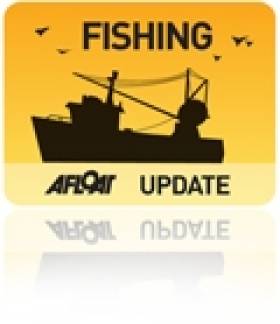Displaying items by tag: aquaculture
Campaigners In Dispute with BIM Over Galway Bay Fish Farm Report
#GALWAY FISH FARM - Environmental campaigners have retracted their accusation that Bord Iascaigh Mhara (BIM) suppressed a report critical of the proposed deep-sea fish farm in Galway Bay.
The Galway Independent reports on a statement released by lobby group Friends of the Irish Environment, which claimed that BIM tried to hide the study by not posting it on its website along with other materials made available for the public consultation period.
The report in question was commissioned by Inland Fisheries Ireland and is critical of the Environmental Impact Statements carried out on the proposed location for the 15,000-tonne organic salmon farm off the Aran Islands.
As previously reported on Afloat.ie, the salmon farm would be located on a 500-hectare site off Inis Oírr, and would be one of the largest of its kind in Europe, projected to be worth €103 million annually for the economy. The scheme has faced opposition from local anglers who fear it could have a negative impact on wild salmon numbers.
BIM strongly denied any wrongdoing, and the lobby group subsequently retracted its allegations upon learning that the IFI report had missed the deadline for submissions for the consultation.
“BIM certainly did not suppress or ignore or gloss over anything from IFI, because we never received anything," said a BIM spokesperson.
However, Friends of the Irish Environment now alleges that the IFI report was late due to a delay in their receipt of the Environmental Impact Statement from BIM.
The Galway Independent has more on the story HERE.
Public Consultation on Galway Bay Fish Farm Set to Begin
#GALWAY FISH FARM - Galway Bay FM reports that a full public consultation on proposals for what's set to be Europe's largest fish farm off the Aran Islands is scheduled to begin next week.
As previously reported on Afloat.ie, the 15,000-tonne deep-sea organic salmon farm would be located on a 500-hectare site in Galway Bay off Inis Oírr, and would be one of the largest of its kind in Europe, projected to be worth €103 million annually for the economy.
The statutory consultation period ended earlier this month after delays over the summer in publishing the licence application. And from next Monday 15 October, Bord Iascaigh Mhara (BIM) will make the plan and all statutory feedback available to the public via its website at www.bim.ie.
Advertisements announcing the consultation will appear in local and national newspapers, and packs will also be available to view for locals at Kilronan and Salthill Garda stations, including copies of the environmental impact statements and information on the statutory consultation process.
BIM aquaculture development manager Donal Maguire told Galway Bay FM that transparency is key to ensuring the public had all the information they need regarding the scheme - which has faced opposition from local anglers who fear the fish farm could have a negative impact on wild salmon numbers.
NI Anglers Opposed to Exclusive Protected Status for Farmed Salmon
#ANGLING - Northern Ireland anglers have balked at proposals to secure protected region of origin status for 'Irish salmon' so that only farmed salmon can use the name.
As the Belfast Telegraph reports, the Ulster Angling Federation (UAF) has lodged an objection to the application for protected geographical indication (PGI) status, of the kind that protects the names of foods and drinks like Champagne and Parmesan cheese.
NI anglers argue that the term 'Irish salmon' has been seized by the aquaculture industry "to create the illusion that consumers are receiving a wild Irish product".
UAF chair Jim Haughey suggests that the name be amended to 'Farmed Salmon from Ireland'.
BIM Decries 'Scare Tactics', Urges Support for Fish Farming
#FISHING - Bord Iascaigh Mhara (BIM) has called on environmental campaigners opposed to changes in the current fish farm licensing system to "get behind Ireland's aquaculture industry".
In a letter to The Irish Times yesterday, the fisheries board wrote in response to Tony Lowes of Friends of the Irish Environment, whose own letter to the paper on Tuesday lambasted the IFA's claims of an "inexplicable delay" in the State's processing of licence applications for new fish farms off the west coast.
BIM chief executive Jason Whooley said it was "refreshing" to read Lowes "expressing confidence in and support for the current Irish aquaculture licensing system", which is "both rigorous and science-based... involves a high level of public consultation and is fully transparent."
However, Whooley hit out at what he described as Lowes' "scare tactics" and "spurious" attempts "to mislead by comparing the output from a salmon farm with human sewage".
Lowes had written that salmon farming "is a highly polluting industry", and that discharge of nitrogen and phosphorous from aquaculture facilities "can fuel toxic algae blooms, which have cost the shellfish industry dear".
Whooley countered that argument, stating that "the harmful elements from human sewage, such as E.coli, cryptosporidium or viruses, are simply not present in the excretions from cold-blooded creatures, such as the Atlantic salmon."
He also urged Lowes to "get behind Ireland’s aquaculture industry and support it as a sustainable and valuable source", adding that "increasing the output of farmed Irish organic-certified salmon represents a great opportunity to create a large number of sustainable jobs in Ireland’s coastal communities."
Fish Farm Delays Not 'Inexplicable' Say Environmental Campaigners
#FISHING - Environmental campaigners have lambasted the IFA's claims of an "inexplicable delay" in the State's processing of licence applications for fish farms.
In a letter to The Irish Times yesterday, Tony Lowes of Friends of the Irish Environment says that the delay – to allow for proper environmental studies to be conducted – "has been explained again and again" by Minister for the Marine Simon Coveney.
He was responding to a letter last Friday by Richie Flynn of IFA Aquaculture, who highlighted the "suffering" of coastal communities as a result of processes that "hamper development and delay investment in the hundreds of companies involved in farming salmon, oysters, mussels, trout and other species".
Lowes writes in counter that salmon farming "is a highly polluting industry", and that discharge of nitrogen and phosphorous from aquaculture facilities "can fuel toxic algae blooms, which have cost the shellfish industry dear".
He claims that the proposed salmon farm in Bantry Bay in West Cork would have a nitrogen and phosphorous discharge "equivalent to the sewage of a town 10 times the size of Bantry".
Lowes also alleges that the deep-sea "super salmon" farm in Galway Bay - the licence application for which is undergoing statutory consultation till 2 October - would produce the equivalent effluent of a city more than double the size of Galway.
In addition, he makes reference to the threat to native salmon in Irish rivers through sea lice infestations.
"The EU habitats directive requires baseline studies and environmental impact statements," writes Lowes. "Licensees can be granted only if the project will not have adverse impacts on protected species and habitats."
Statutory Consultation Underway for Galway Bay Salmon Farm Licence
#FISHING - Bord Iascaigh Mhara (BIM) has begun the process of statutory consultation as the next step in its licence application for the controversial proposed deep-sea fish farm in Galway Bay.
As previously reported on Afloat.ie at the end of June, Ireland's fisheries board had announced a "significant delay" of four to six weeks before publishing the licence application.
But in a recent statement, BIM announced that it received permission some weeks ago from the Department of Agriculture, Food and the marine to begin the statutory consultation process, in which it is sharing the licence application and Environmental Impact Statement "with a list of State bodies for their appraisal and feedback".
The statutory consultation will continue till Tuesday 2 October 2012, and BIM promises that all feedback will be made available to the public via the BIM website "to further assist them in their assessment of the Environmental Impact Statement when it goes to full public consultation".
The 15,000-tonne organic salmon farm would be located off Inis Oírr in the Aran Islands on a 500-hectare site, and would be one of the largest of its kind in Europe, projected to be worth €103 million annually for the economy.
BIM intends to franchise the licence, should it be approved, to a third party "who agrees to a legally binding contract to farm the Atlantic salmon to the highest organic and environmental standards". Approval of the project could also see the creation of as many as 500 jobs, some 20% more than previously estimated.
The news comes after the ministerial apprival of salmon farm licence assignments from five separate operators in nearby Connemara, designed to "consolidate and revitalise" aquaculture in the region.
But the Aran Islands scheme has faced opposition from local anglers who fear that the fish farm could have a detrimental effect on wild salmon numbers.
Explaining BIM's plans for the consultation process, the statement added: "Previously, both statutory and public consultation would have been carried out in parallel. However, Ireland has recently (June 2012) ratified the Aarhus Convention. The convention lays down rules to promote citizens involvement and to improve public consultation in the making of decisions with potential environmental impact by the state.
"Given the recent ratification of the Convention and for a number of other legal and technical reasons, the Minister for Agriculture, Food and the Marine, Simon Coveney TD, has signed a new Statutory Instrument (SI No 301 of 2012), bringing into law new periods of public consultation for fish farm licence applications. In this instance the Department of Agriculture, Food and the Marine have instructed BIM to carry out statutory consultation in full before proceeding with public consultation.
"BIM believes that this approach will help to further inform the public during their period of consultation."
#FISHING - Bord Iascaigh Mhára (BIM) has moved to allay fears that the proposed new fish farm in the Aran Islands would have a detrimental effect on wild salmon numbers, according to the Galway Independent.
BIM was reacting to concerns raised at a meeting of the Federation of Irish Salmon and Sea Trout Anglers (FISTA) held last Sunday, ahead of which the federation's secretary Noel Carr described the fish farm plans as its 'Alamo'.
As previously reported on Afloat.ie, BIM launched the consultation process last December for its proposed deep-sea salmon farm in Galway Bay on a 500-hectare site north of Inis Óirr.
Approval of the project, which would be one of the largest of its kind in Europe, could see the creation of 350 direct and 150 indirect jobs.
Among his group's concerns, Noel Carr told the Galway Independent that salmon farms such as that proposed for Galway bay were finding wild fish out in the North Atlantic and “hoovering it up to make fish meal”.
But Donal Maguire, aquaculture development manager for BIM, said that argument was "not true", adding that "the world catch for fishmeal has been sustainable for about the last 35 years".
The Galway Independent has more on the story HERE.
#FISHING - The Irish Farmers' Association (IFA) aquaculture executive has criticised the Government's grant aid scheme announced this week, claiming that it rules out the majority of Ireland's fish farming industry from accessing funds.
Richie Flynn said that the rules for grant aid insist that applicants hold a "current licence", which he claims is "virtually impossible" to procure at present.
“The prolonged and unnecessary delays in dealing with licenses are within the control of the Department of Agriculture, Marine and Food to resolve with the National Parks and Wildlife Services," he said. "The fact that they have not succeeded in issuing renewals to industry since 2007 is their fault.
"Now we have a situation where to avail of grant aid, the same department are insisting on having an up to date licence, which is virtually impossible to achieve, from their colleagues in the same offices in Clonakilty.
"It makes a mockery of the grant aid system and exposes the insanity of holding back an industry which can provide vital jobs and exports for our coastal peripheral areas."
The IFA also described as "technically and practically unfeasible" the Government's insistence that grant-funded projects be completed before the end of the calendar year.
“The industry is wondering if the department is deliberately trying to set up a situation where they give themselves no choice but to give back their aquaculture budget to the Department of Finance for the third year in a row to make themselves look good," he said. "From the point of view of fish farmers, processors, customers, suppliers, consumers and industry watchers, it looks anything but good."
Flynn called on Minister for the Marine Simon Coveney to "re-examine his own departmentally imposed restrictions, which are not required by EU rules, and give a boost to a sector which has serious demand for its products and a bright future ahead if domestically imposed obstacles are removed.”
Marine Escapes Cuts in Latest Budget
#BUDGET - Coastguard and lifeboat services, mountain rescue and the Commissioners of Irish Lights will not face any further funding cuts in the latest Budget, according to the Minister for Transport.
The Irish Times reports that, following the reduction of his department's budget, Minister Leo Varakdar stated that substantial cuts have already occurred in the maritime safety sector.
Moreover, he announced an increase in the maritime budget from €70.5 million to €80.3 million, due to provisions for the new Irish Coast Guard helicopter contract.
Earlier this week, Minister for Agriculture, Food and the Marine, Simon Coveney, underlined the importance of the marine sector to Ireland's coastal communities.
As previously reported on Afloat.ie, Minister Coveney announced a round of expenditure estimates on Monday which include increased funding for investment in processing, aquaculture and fishery harbours.
Damanaki Promises 'Level Playing Field' in Common Fisheries Policy Review
The European Union's maritime affairs commissioner has promised a "level playing field" during the review of the Common Fisheries Policy (CFP), The Irish Times reports.
As previously reported on Afloat.ie, Maria Damanaki was in Dublin on Thursday to discuss reform of the policy with Irish stakeholders.
She admitted that Ireland had suffered under the current policy, which has led to overfishing in Irish waters by other EU member states such as Spain.
The commissioner said that better maritime planning and protection of "small-scale fisheries" were fundamental to the new CFP.
But she denied that Ireland's situation would worsen under the new proposals, which include concessions on transferable quotas that critics - including Minister for the Marine Simon Coveney - fear would see multinationals buying up Irish fishing rights.
She said similar concessions had worked in Denmark, the US, Australia and New Zealand, adding that the system is designed to compensate those who want to leave fishing without straining the EU's finances.
Damanaki also discussed encouraging the development of offshore aquaculture to combat rising imports of seafood, and her commitment to ending the practice of fish discards - which may also involve a programme to provide lower-income individuals with cheaper fish.
The Irish Times has more on the story HERE.


























